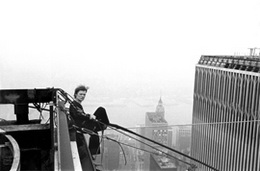James Marsh’s remarkable documentary “Man on Wire” is a reminder that in a rigid world filled with rules and regulations, true beauty can come from the most indefinable of acts. After French highwire walker Philippe Petit was arrested for walking across the Twin Towers of New York’s World Trade Center in 1974, the press only wanted to know one thing: Why?
How unimaginative.
What “Man on Wire” does so effortlessly is traverse the dangerous area between an audience’s need to know everything they can about the story and yet still have something left to the imagination. Director Marsh uses artfully shot and semi-obscured re-enactment footage (a la Errol Morris) alongside a score taken straight out of a fictional suspense movie to tell the tale of “the coup,” which is the name given to the stunt by the 24 year-old Petit and his young accomplices.
You know what? Documentary filmmaking doesn’t have to be issue-related and it doesn’t have to preach. Like last year’s “The King of Kong” was a window into the bizarre subculture of classic arcade gamers, “Man on Wire” is a look into the peacefully rebellious spirit of a bygone era. The other thing it has in common with “Kong” is its firm grasp of storytelling.
Marsh opens with Petit’s team sneaking their way past guards to enter the buildings. Rules are broken, co-conspirators crack, and through it all, one thing remains crystal clear: Petit will prevail. It had been his singular vision since he read about the construction of the legendary buildings in a dentist’s office magazine in 1968.
 Marsh returns to the scene of the crime throughout the film, with brief interludes that tell just enough of Petit’s background and some of his other feats of derring-do, such as his walks at the Notre Dame Cathedral in Paris and Sydney, Australia’s Harbour Bridge. But the director is not interested in psychoanalyzing the tightrope walker or trying to reveal every minute planning detail or the financial strain involved in such a feat. This is a movie concerned with that otherworldly desire called obsession. You can hear the passion Petit feels for his story even now, as he narrates the film by illustrating it himself. He gets excited—and gestures wildly with his hands, gets out of his chair, and hides behind curtains in character, all with a mischievous glint in his eye.
Marsh returns to the scene of the crime throughout the film, with brief interludes that tell just enough of Petit’s background and some of his other feats of derring-do, such as his walks at the Notre Dame Cathedral in Paris and Sydney, Australia’s Harbour Bridge. But the director is not interested in psychoanalyzing the tightrope walker or trying to reveal every minute planning detail or the financial strain involved in such a feat. This is a movie concerned with that otherworldly desire called obsession. You can hear the passion Petit feels for his story even now, as he narrates the film by illustrating it himself. He gets excited—and gestures wildly with his hands, gets out of his chair, and hides behind curtains in character, all with a mischievous glint in his eye.
When Petit is silent, the movie has time to catch its breath. Marsh lets the images—
and there are plenty of them—do the talking. When the moment finally comes, “Man on Wire” knows you are fully invested in watching a man who conspired for years to reach the top of modern mythological buildings for no other reason than the sheer thrill and wonderment of the act itself.
Seeing someone who is seemingly floating 1,300 feet in the air and is at the peak of his confidence is something else. It may be ridiculously dangerous and illegal, but it’s also extremely liberating. When Petit reaches his goal of a lifetime, there is joy. But there is also melancholy as the high subsides and relationships are changed. Is there a place for selfishness in pursuit of a common goal? Most definitely. What would human accomplishment be without human folly?
“Man on Wire” puts you in the Twin Towers (whose destruction is never mentioned once throughout the film, presumably not to ruin the beauty of the occasion). It makes the World Trade Center, which captured the imagination of millions during this time period, come alive again. You’re right there with Petit, hiding under a tarp to evade guards, stepping out onto the 140 ft. wire for the first time, and finally taunting NYC’s finest as they try to apprehend him—knowing full well that the cops aren’t crazy enough to go out there and follow him. Thank God Marsh was.








{ 2 comments }
Wow, thanks for this review Eric. After reading this I went to go see “Man on Wire” and wow, what a wonderfully inspiring movie. It made my whole week!
That is so cool. You didn’t waste any time, did you? One thing I didn’t really touch on the the review was how much the director played with camera angles and zooms in his interview subjects. He even had one of the co-conspirators playing the piano. Marsh was breaking down the traditional medium-shot interview thing, and each time he did, it added to the “character” of each person. Documentaries are really in a rich period right now…
Comments on this entry are closed.